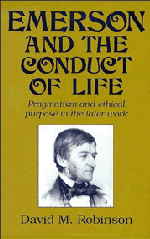Book contents
- Frontmatter
- Contents
- Acknowledgments
- List of Abbreviations
- Introduction
- 1 The Mystic and the Self-made Saint
- 2 Politics and Ecstasy
- 3 The Text of Experience
- 4 “Here or Nowhere”: Essays: Second Series
- 5 The Eclipse of the Hero: Representative Men
- 6 The Old and New Worlds: English Trait
- 7 “Work Is Victory”: The Conduct of Life
- 8 “Plain Living and High Thinking”: Society and Solitude
- 9 Toward a Grammar of the Moral Life
- Notes
- Work Cited
- Index
- Titles in the series
- Frontmatter
- Contents
- Acknowledgments
- List of Abbreviations
- Introduction
- 1 The Mystic and the Self-made Saint
- 2 Politics and Ecstasy
- 3 The Text of Experience
- 4 “Here or Nowhere”: Essays: Second Series
- 5 The Eclipse of the Hero: Representative Men
- 6 The Old and New Worlds: English Trait
- 7 “Work Is Victory”: The Conduct of Life
- 8 “Plain Living and High Thinking”: Society and Solitude
- 9 Toward a Grammar of the Moral Life
- Notes
- Work Cited
- Index
- Titles in the series
Summary
“Power, new power, is the good which the soul seeks”
(W, 8:63).A generation of scholars has come to read Emerson as a philosopher of power. The discovery that power was “Emerson's True Grail,” as Barbara Packer put it, has secured on quite new grounds his place as a founder of American culture. This new sense of Emerson is marked by a notable deemphasis on the elements of his philosophy that had constituted his achievement for earlier readers – his metaphysical idealism and his articulation of the transcendent sources of the human personality. Joel Porte broadly anticipated this emphasis in his reading of Emerson in terms of the ebb and flow of power in the human cycle of aging, and Emerson's conception of power, both psychological and political, has come to be a central concern of many of Emerson's readers. David Marr has argued that Emerson regarded the achievement of “power” as the “highest end of culture,” and has noted the difficult distinction between such personal power and egotism. Michael Lopez has remarked on the emphasis on force, power, and even war in Emerson's thought and rhetoric, proposing that “nearly all of Emerson's major essays can be read as fables of the self, the soul, the mind, man, or humankind in the process of struggling for, gaining, losing, or rewinning some form of power.”
- Type
- Chapter
- Information
- Emerson and the Conduct of LifePragmatism and Ethical Purpose in the Later Work, pp. 1 - 7Publisher: Cambridge University PressPrint publication year: 1993



